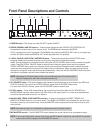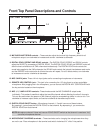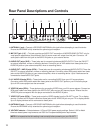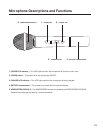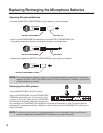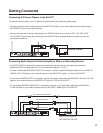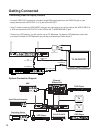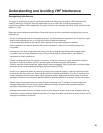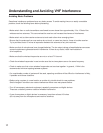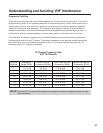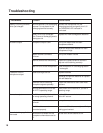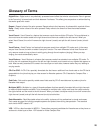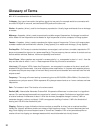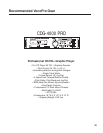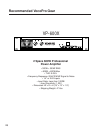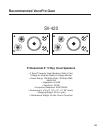
21
Glossary of Terms
A/V - A/V is an abbreviation for Audio/Visual.
Y-Adapter - Any type of connection that splits a signal into two parts. An example would be a connector with
one male RCA jack on one end, and two female RCA jacks on the other end.
Woofer - A speaker, (driver), used for low-frequency reproduction. Usually larger and heavier than a midrange
or tweeter.
Midrange - A speaker, (driver), used to reproduce the middle range of frequencies. A midrange is combined
with a woofer for low frequencies and a tweeter for high frequencies to form a complete, full-range system.
Tweeter - A speaker, (driver), used to reproduce the higher range of frequencies. To form a full-range system,
a tweeter needs to be combined with a woofer, (2-way system), or a woofer and midrange, (3-way system).
Pre-Amplifier - Or Pre-amp is a device that takes a source signal, such as from a turntable, tape-deck or CD
player, and passes this signal on to a power-amplifier(s). The pre-amp may have a number of controls such as
source selector switches, balance, volume and possibly tone-controls.
Out of Phase - When speakers are mounted in reverse polarity, i.e., one speaker is wired +/+ and -/- from the
amp and the other is wired +/- and -/+. Bass response will be very thin due to cancellation.
Line Level - CD players, VCRs, Laser disc Players etc., are connected in a system at line level, usually with
shielded RCA type interconnects. Line level is before power amplification. In a system with separate pre-amp
and power-amp the pre-amp output is line level. Many surround sound decoders and receivers have line level
outputs as well.
Frequency - The range of human hearing is commonly given as 20-20,000Hz (20Hz-20kHz). One hertz (Hz)
represents one cycle per second, 20Hz represents 20 cycles per second and so on. Lower numbers are lower
frequencies
Gain - To increase in level. The function of a volume control.
Decibel (dB) - Named after Alexander Graham Bell. We perceive differences in volume level in a logarithmic
manner. Our ears become less sensitive to sound as its intensity increases. Decibels are a logarithmic scale
of relative loudness. A difference of about 1 dB is the minimum perceptible change in volume, 3 dB is a
moderate change in volume, and about 10 dB is an apparent doubling of volume. 0 dB is the threshold of
hearing and 130 dB is the threshold of pain.
Clipping - Refers to a type of distortion that occurs when an amplifier is driven into an overload condition.
Usually the "clipped" waveform contains an excess of high-frequency energy. The sound becomes hard and
edgy. Hard clipping is the most frequent cause of "burned out" tweeters. Even a low-powered amplifier or
receiver driven into clipping can damage tweeters which would otherwise last virtually forever.
NOTE: The low VHF TV channels (2 through 6) are not used for wireless microphones and do not need to be considered



